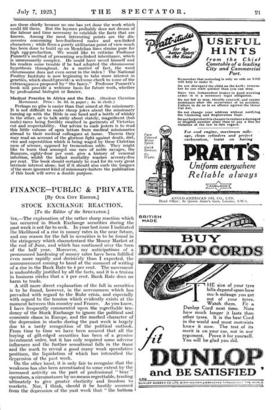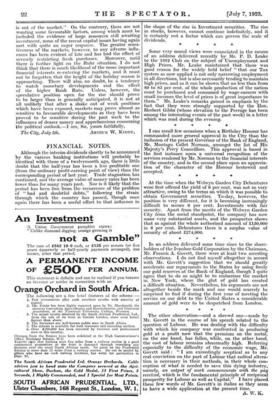FINANCE-PUBLIC & PRIVATE.
[By OUR CITY EDITOR.]
STOCK EXCHANGE REACTION.
[To the Editor of the SPECTATOR.] SI11,—The explanation of the rather sharp reaction which has occurred in Stock Exchange securities during the past week is not far to seek. In your last issue I indicated the likelihood of a rise in money rates in the near future, and one reason for the fall in securities is to be found in the stringency which characterized the Money Market at the end of June, and which has continued over the turn of the half year. Moreover, my anticipations of a pronounced hardening of money rates have been fulfilled even more rapidly and decisively than I expected, the announcement corning to hand at the moment of writing of a rise in the Bank Rate to 4 per cent. The movement is undoubtedly justified by all the facts, and it is a truism in business circles that a 4 per cent. Bank Rate does no harm to trade.
A still more direct explanation of the fall in securities is to be found, however, in the nervousness which has prevailed with regard to the Ruhr crisis, and especially with regard to the tension which evidently exists at the moment between this country and France. As you know, I have frequently commented upon. the regrettable ten- dency of the Stock Exchange to ignore the political and economic chaos in Europe, and the marked character of the depression in stocks during the past week is largely due to a tardy recognition of the political outlook. From time to time we have been assured that all the buying of gilt-edged securities has been of a genuine investment order, but it has only required some adverse influences and the further sensational falls in the franc and the mark to reveal a good many weak speculative positions, the liquidation of which has intensified the depression of the past week. On the other hand, it is only fair to recognize that the weakness has also been accentuated to some extent by the increased activity on the part of professional " bear " operators, a circumstance by no means regrettable, tending ultimately to give greater elasticity. and freedom to market.. Nor, I think, should it be hastily assumed from the depression of the past week that "the bottom is out of the market." On the contrary, there are not wanting some favourable factors, among which must be included the evidence of large resources still awaiting investment, some of the recent capital issues having again met with quite an eager response. The greater sensi- tiveness of the markets, however, to any adverse influ- ences has been evident of late and has had the effect of severely restricting fresh purchases. Moreover, until there is further light on the Ruhr situation, I do not think that there is much likelihood of the more important financial interests re-entering the markets, and it must not be forgotten that the height of the holiday season is approaching. There will also, no doubt, be a tendency to watch monetary developments and the effect of the higher Bank Rate. Unless, however, the speculative position open for the rise should prove to be larger than is generally anticipated, it is not at all unlikely that after a shake out of weak positions which have been exposed, markets may prove almost as sensitive to favourable developments as they have been proved to be sensitive during the past week to the influences of dearer money and apprehensions concerning the political outlook.—I am, Sir, yours faithfully,















































 Previous page
Previous page